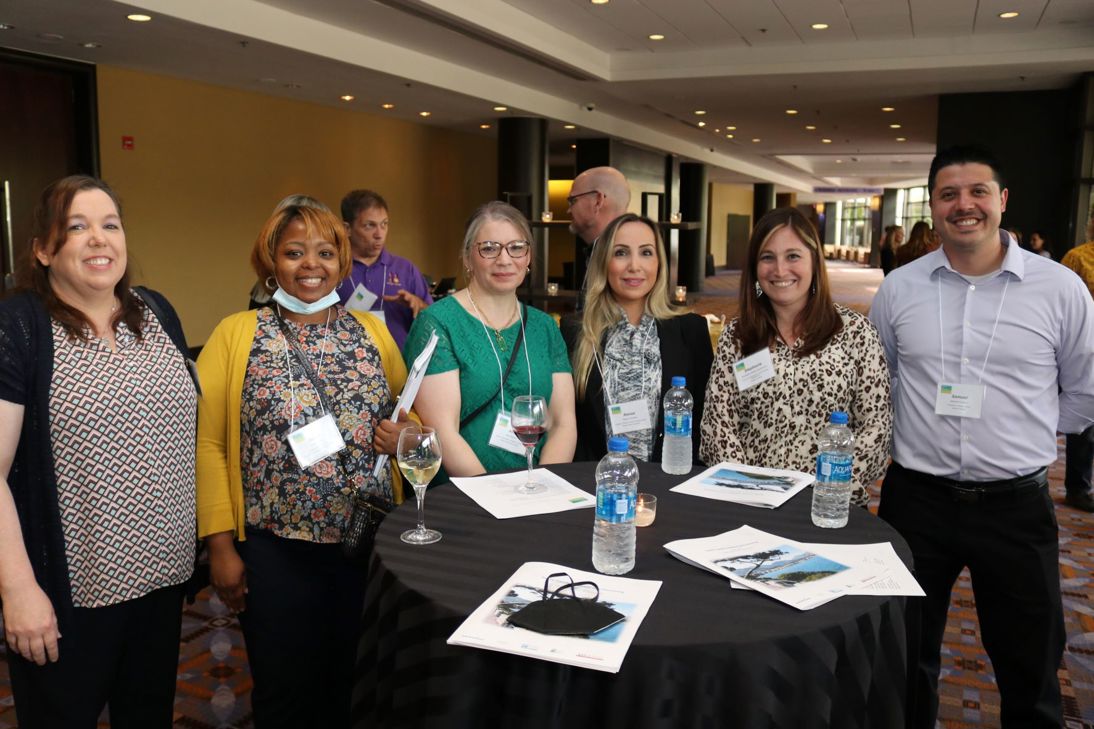Grants and Investments for Transfer Success
July 11, 2022

By Sarah Belnick, Senior Program Director, College Success and Saúl Valdez, Program Officer, College Success
In January 2021, ECMC Foundation announced the launch of the Catalyzing Transfer Initiative (CTI), which provided $4.5 million to five organizations that are taking the charge to increase successful transfer of postsecondary credits and timely bachelor’s degree completion through bold equity-centered projects. Through this initiative, we sought to spur the development and wider adoption of clear and equitable articulation agreements among higher education institutions nationwide and activate the key conditions that could propel transfer student success at the state and systems level.
The need for this work is as urgent today as it was before the onset of the COVID-19 pandemic. According to the National Student Clearinghouse Research Center, only 15 percent of students who start at a community college earn a bachelor’s degree within six years. What’s more, according to the Center’s May report, “Transfer, Mobility, and Progress,” COVID-19 reduced almost every type of transfer and credit mobility function, including upward transfer enrollment and continuing transfers among public four-year and community colleges. These trends persist across age groups, races and ethnicities and genders.
As the recent Education Commission of the States’ “National Transfer Landscape Analysis” breaks down, reform-focused efforts can have a lasting impact in every state. To help change the transfer landscape across the country, our CTI grantees have engaged more than 100 institutions in 33 states. In the words of engineer W. Edward Deming, “Every system is perfectly designed to achieve the results that it gets.” Together with our grantees, we are working toward a sea change in having institution, system and state leaders redesign their transfer processes to achieve equitable outcomes.
Progress Along Transfer Pathways
Our CTI grantees and partners have made steady progress since the initiative launched. Their work targets multiple aspects of transfer reform, and each grantee is making unique contributions to the higher education ecosystem.

Participants gather during AACC’s first Equity Transfer Initiative meeting in Chicago. (Photo taken by Kent Phillippe, AACC)
American Association of Community Colleges (AACC)
AACC’s Equity Transfer Initiative (ETI) comprises 17 partnerships between two- and four-year institutions to advance transfer pathways. Data reported last fall suggest approximately 14,000 students were on one of the transfer degree pathways. ETI held its first in-person convening last month, allowing 80 transfer professionals from partner institutions to finally meet each other face-to-face in Chicago while discussing equity, sustainability and data collection across the transfer experience. The project team is currently developing a hands-on guidebook with modules and digital resources that colleges and universities can use to build and sustain meaningful equity driven transfer relationships.
Education Commission of the States (ECS)
Throughout the grant period, ECS has acted as a facilitator and convener for CTI grantees. Meetings facilitated by ECS have helped to cultivate a collaborative spirit across the CTI community of grantees that allows members to leverage each other’s successes. In September, ECS will host the CTI Convening for leaders of each project. This event will provide an important in-person opportunity for grantees to share their learnings and advance their work.
Institute for Higher Education Policy (IHEP)
TransferBOOST (Bachelor’s Opportunity Options that are Straightforward and Transparent), a reform effort by IHEP, seeks to support students’ transfer success through partnerships in Arizona, Illinois and Virginia that prioritize addressing affordability and providing clear communications and commitments to improve cost and time-to-degree. IHEP and its partner, HCM Strategists, are working with state leaders to provide technical assistance and expertise to two- and four-year partnerships that aim to improve transfer processes. The TransferBOOST team is now turning to marketing and outreach efforts, working closely with institutional partners to promote the affordability and accessibility of transfer opportunities to students in clear and compelling ways.
State Higher Education Executive Officers Association (SHEEO)
SHEEO’s Transfer Policy Standards for Equitable Attainment emphasizes the promotion of equitable transfer outcomes for students of color and low income students. Four states are currently participating in the project: Colorado, North Carolina, South Carolina and Washington. The project team is preparing to share their progress thus far during a session at SHEEO’s annual Higher Education Policy Conference in Indianapolis, Indiana this August. The presentation will include representatives from SHEEO and its project partner, the Gardner Institute, who will share findings on how different states are innovating when it comes to analyzing state transfer policies and information on transfer outcomes. The session will also offer perspectives from a recent transfer student on their experience. One of the early findings of the project is the need to improve data collection about transfer pathways. Participating states are each working on ways to improve data collection, from empowering independent institutions in North Carolina to encouraging allyship from the Washington State Legislature by developing a report that designed to convince members that better data collection is needed.
Western Interstate Commission for Higher Education (WICHE)
WICHE’s Interstate Transfer Passport®, a unique model, engages member institutions to agree to 63 shared learning outcomes to enable block transfer among them. With its CTI grant, WICHE has added 19 institutions to its network, 10 of which are minority-serving institutions (MSIs), and is now working on better engaging registrars, advisors and students to utilize the program. Looking ahead, WICHE also aims to specifically engage with more MSIs, including HBCUs and tribal colleges, as well as find new ways to ensure students enrolled throughout the 72 Passport member institutions can make informed choices about their transfer opportunities. As of academic year 2020-21, more than 70,000 students have earned Interstate Passports.
Learning Community
In addition to grantmaking, CTI facilitates an ongoing peer exchange among grantees to enable shared growth, successful practices and other synergies. CTI also provides grantees with the opportunity to hear from experts outside the cohort. The community of practice has met quarterly since its inception, with the fourth event scheduled for this summer.
Led by Jeremy Anderson of ECS, participants in the first October 2021 meeting reflected on the intersection of state and institutional policy and practice following a presentation on evaluating the state transfer policy environment from IHEP and HCM Strategists. The February 2022 gathering featured Doug Shapiro from the National Student Clearinghouse (NSC), who spoke about the organization’s outlook on transfer and enrollment, leading to a breakout discussion on the corresponding NSC report and how both it and potential subsequent reports could inform work going forward. The most recent meeting, in April 2022, had a presentation from the Education Strategy Group’s Matt Gandal and Brett Visger on the Attainment Academy, sparking questions and conversations on where they see transfer fitting into the larger state attainment conversation.
Learning Partner Highlights
The learning community has also welcomed staff from the Aspen Institute College Excellence Program (CEP). Thanks to funding from Ascendium Education Group, Aspen is partnering with the American Association of State Colleges and Universities to deliver the Transfer Student Success and Equity Intensive. The Transfer Intensive supports 31 community college-university partnerships over the course of the year to reform transfer practice, with an emphasis on leadership and equity. Aspen’s participation in CTI is offering further confirmation of the need for actionable transfer data that is disaggregated by income and race/ethnicity to help overhaul systems that are not helping students achieve successful outcomes. Aspen and ECMC Foundation are exploring future projects to address this national need.
Informed Grantmaking and Strategic Investing
CTI has also informed other ECMC Foundation grants related to transfer. Some of those funded projects include:
- American Indian College Fund: Forming institutional partnerships and articulation agreements to facilitate transfer agreements for tribal colleges and universities
- Open Syllabus: Mapping college curriculum across millions of syllabi to support novel teaching and learning applications
- RP Group: Using new research to understand the experiences of students on their transfer journeys
- WASC Senior College and University Commission & Sova Solutions: Looking at how an accreditor’s role can center transfer-specific strategies and promote accountability measures
Furthermore, learnings from CTI have informed Education Innovation Ventures’ $250,000 investment in the expansion of EdVisorly. The software platform guides community college students interested in transferring to a four-year institution. It helps them to build course maps that correspond to institutional course management systems and make sense of complex articulation agreements. So far, 300 students have used the platform.
Looking Ahead
For a complex topic that must incorporate 50 states’ standards and thousands of institutions’ different needs, transfer success is an area where ECMC Foundation can spark transformative change. CTI has focused and advanced that effort in key ways, from fostering innovative new programs to convening important conversations among stakeholders nationwide.
As we have grown to better understand the challenges and opportunities at hand — and as our grantees have gotten to work in the field — the outlook for transfer student success may finally be starting to improve.
ECMC Foundation remains committed to exploring promising findings, sharing key trends and making many more future investments in this arena. We are always open to new ideas, grant applicants and partners. Submit a letter of inquiry today if you’d like to contribute to transfer success.
